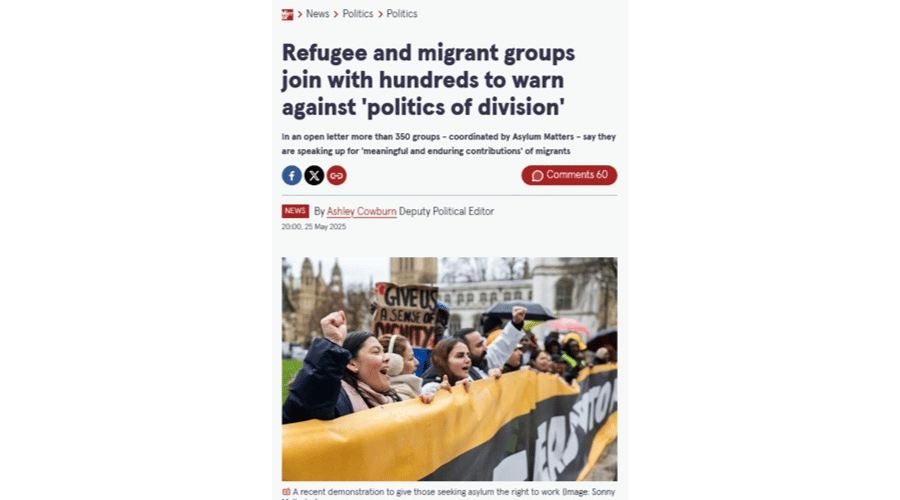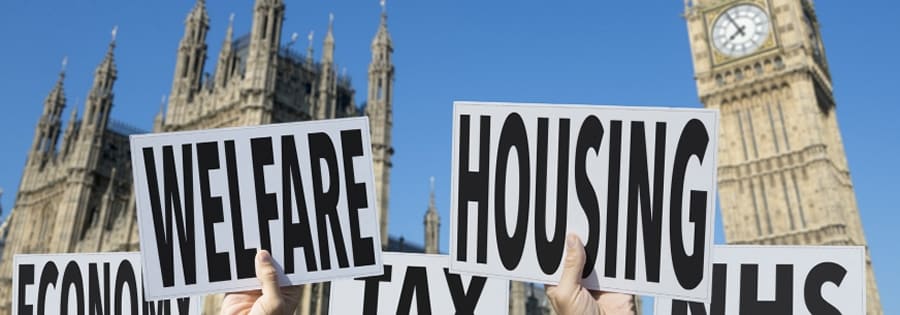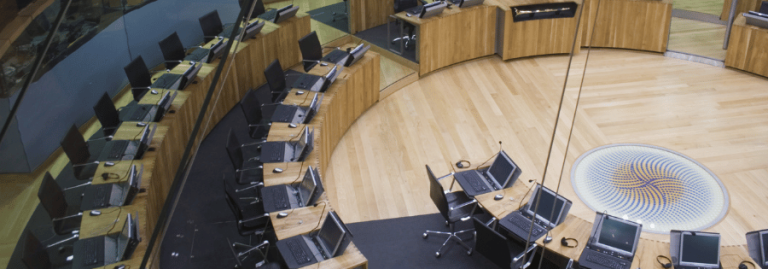Ongoing reaction to the government’s immigration plans
Are the government’s immigration plans, announced in May, “untethered from reality” (Jonathan Portes, in The Guardian)? Or is it that “Keir Starmer loves a crackdown” (Angus Reilly in UnHerd)?
The prime minister’s speech and a white paper set out the plans. Here we look at key areas of contention from a housing and integration perspective, with commentary on each.
Where will the government’s plan take us?
Jonathan Portes believes that the UK – in contrast to many other European countries – is good at integrating migrants. But the government’s rhetoric and policy “will take us backward to a much uglier, and more dangerous, place.” In contrast, Robert Shrimsley in the Financial Times says that “Excessive immigration is a real and corrosive issue.” At least Keir Starmer is “consistent in his ability to satisfy no one,” he adds. The new immigration plan is not enough for the hardliners, but too much for the liberals.
In the Daily Telegraph, Allister Heath goes further, arguing for what he calls “net zero” immigration: “Previous dismissals and broken promises played midwife to Brexit and are capable of powering Reform — or a Conservative facsimile — into office unless Labour draws the sting from the issue.”
Stephen Bush, in the FT, says that Britain’s level of immigration is typical and to change it implies a different approach to the economy and the makeup of the UK workforce. In the New Statesman, George Eaton agrees; he suggests that via Labour’s immigration controls we are in for “a great economic experiment.”
“An island of strangers” – joint statement issued
Particularly controversial was the prime minister’s referring to Britain as “an island of strangers.”
Over 350 organisations, including CIH, signed a statement saying: “We are an Island of Solidarity, not Strangers.” The statement was covered in The Mirror and there are posts on Bluesky and Facebook. Nation Cymru covered the campaign and said that the Welsh Refugee Council and many Welsh groups endorse the statement. Many Scottish organisations also added their names.

Pierre Makhlouf, legal director at Bail for Immigration Detainees said: “To claim the UK risks becoming ‘an island of strangers’ while deliberately fuelling division and setting communities against each other is not just hypocritical—it’s reckless and dangerous.”
In the Observer, Kenan Malik argued that “politicians ignore deeper developments and blame everything on immigration.” In Byline Times, Daniel Sohege argued that “Keir Starmer’s government is now even more anti-migrant than its Conservative predecessors.” Also in Byline Times, Zoe Gardner explained “Why Keir Starmer is wrong about immigration” and dispelled some myths that government rhetoric sustains.
Shruti Bhargava in a blog for the Housing Diversity Network asks: “Is it possible to talk about controlling immigration without attacking and scapegoating migrants, refugees and those seeking asylum from war, famine or persecution? I think it is. But it seems to be a sad fact that our prime minister, Keir Starmer, doesn’t.”
The prime minister later said he should not have used the phrase about an island of strangers. “No, it wasn’t right,” he said. “I’ll give you the honest truth: I deeply regret using it.”
Pledges to bring down net migration
“A 100,000 drop in immigration per year by 2029” is forecast to result from government plans, reported the BBC. But Professor Brian Bell, chair of the Migration Advisory Committee, warned that if net migration falls to around 200,000 annually, as he expects, there will be severe labour shortages, particularly in the hospitality and retail sectors.
Sunder Katwala of British Future, writing in the Financial Times, says that Labour is “trapped in this numbers game.” He argues that they should show they are managing numbers downwards but in a balanced way, choosing immigration where workers are needed to meet Labour’s missions on growth and on the NHS, but with an eye on adequate housing supply and cost-benefit analysis by the Treasury. “A published immigration plan, presented to parliament, would make the choices and trade-offs explicit.”
Heather Rolfe analyses public opinion on the white paper for UK in a Changing Europe. She argues that while much of the public is in favour of reducing migration, the white paper is out of line with public thinking because it focuses on labour migration, about which there is much less concern. The social care visa, which the government plans to cut, has strong support.
As CIH’s John Perry points out in an article on myths about migration in Housing Today, the government’s white paper makes no fewer than five references to the “pressure” migration puts on the housing system. This, he argues, is a gross oversimplification of a complex issue. The Big Issue notes that “Tory MP Robert Jenrick says mass migration to blame for rising rents. Here’s what he’s not telling you.” A major factor is past governments’ failure to build new homes, especially social housing, it argues.
Latest figures show that net migration to the UK almost halved in 2024, falling to 431,000. The ONS has a blog discussing the reasons for the fall. The Migration Observatory has a new briefing on the net migration statistics.
Refugee integration and the citizenship issue
The white paper’s section on Fostering Integration and Cohesion promises a new community cohesion strategy to include all migrants. It emphasises the importance of migrants learning English, but the sections on “earned” settlement and citizenship will make it a longer and more difficult process; the white paper is clear that it wants to reduce the numbers who are granted such status.
In February, the government made changes to the “Good Character” guidance it uses when considering citizenship applications. People who entered the UK “illegally” and/ or arrived through “dangerous routes” will normally be refused British citizenship, no matter how long they have been in the UK. The Refugee Council estimates that at least 71,000 refugees who have already been granted status could be affected, a number which is growing as new asylum claims are approved.
Colin Yeo in We Wanted Workers points out that while the white paper welcomes integration it makes it much harder by making people wait longer and pay more. It will also make it harder for people to get a rented home and a job, because of their uncertain status. What measure will be adopted of “contributions to the UK economy and society?”, Yeo asks – the proposed criterion for being allowed to apply more quickly. For example, if volunteering will help accelerate settlement, must it be for a charity or can it also be for a non-charity? What proof will be accepted?
Jonathan Thomas of the Social Market Foundation argues that lengthening the qualifying period for settlement is driven by a desire to reduce the benefits bill. This is based on the (questionable) assumption that migrants from certain backgrounds represent a net cost to the taxpayer over the course of their lifetimes.
Speaking to Politics Home, Bell Ribeiro-Addy MP warned that immigration policies “could produce another Windrush generation.” By retrospectively penalising people who entered the country through irregular routes, as the government is now doing, she believes there could be a new tranche of people with unclear immigration status in years to come.
In a Westminster Hall debate on July 1, Home Office minister Seema Malhotra reiterated government policy, although she added that “we will be looking at new thinking and new models around earned settlement and earned citizenship in the consultation that we will launch later this year.”
Brian Leishman, MP, who initiated the debate, noted that the Scottish Refugee Council’s Sabir Zazai would not get citizenship if he were applying now. Sabir has three honorary doctorates and an OBE. “It is difficult to imagine a more compelling example of integration,” Leishman said, “But because he arrived here in the back of a lorry from Afghanistan, this Government would exclude him from ever being a British citizen.” The Guardian’s Nesrine Malik added: “I got British citizenship via the five-year route. Labour’s new 10-year rule will cause untold pain.”
Organisations in Greater Manchester have signed an open letter calling for action on the “citizenship ban.” The letter is being sent to MPs and lead council members in Greater Manchester.
So far, there are two legal challenges to the rules change, one by Wilson Solicitors and another by Duncan Lewis Solicitors. Charities in the sector provided witness evidence for the second challenge, and The Independent looked at the background to it.
Together with Refugees, with the Immigration Law Practitioners’ Association (ILPA), has a briefing on the citizenship aspect of the “good character” test (endorsed by CIH and over 100 other bodies). ILPA wrote to the home secretary in February and here you can see the letter and the response. ILPA has also written to the Home Affairs Select Committee.
The West Midland Refugee and Migrant Centre also has a straightforward guide to the change, and Migrants’ Rights Network has a factsheet. Free Movement has a useful commentary on the ban and its antecedents.
Together With Refugees has tabled an amendment to the Border Security Bill, which would ensure the new measures are not applied contrary to the UK’s international legal obligations, including the Refugee Convention. You can find the amendment on page 28 here.
The Refugee Council has a timely report, New Roots, New Futures: the need for a national refugee integration strategy. It covers access to affordable housing and several other aspects of refugee integration which need to be addressed.
Opposition leader Kim Badenoch wants a Danish-style “integration plan” which would involve moving non-UK tenants out of areas with high foreign-born populations. UnHerd discusses the problems with carrying this out. The Conservative Party, far from pursuing greater integration, also wants to exclude from welfare benefits any household which has a family member who is a foreign national, regardless of how long they have been in the UK. Coincidentally, the DWP began publishing data on take-up of universal credit, by immigration status: they show little change in the proportion of claimants who were born overseas, which has varied between 15-17 per cent since 2022.
Paradoxically, Italy is voting in a referendum which would allow longstanding migrants to get citizenship. The Financial Times explained the background.
Squeezing out migrant workers in social care and the building industry
Yvette Cooper promises that overseas recruitment of care workers “will end.” But the Financial Times’ Stephen Bush says the government measures might turn us “from a nation with a care industry into one without”. The government has scrapped the existing care worker visa: this was not a well-designed visa route, Bush argues. But, nonetheless, he says: “If you scrap the social care visa and leave nothing in its place, you are going to run into trouble.”
The Morning Star said Labour had delivered a “crushing blow” to the care sector. Unison general secretary Christina McAnea said: “The NHS and the care sector would have collapsed long ago without the thousands of workers who’ve come to the UK from overseas.” For the Bureau of Investigative Journalism, Nandi Msezane, a social care worker, says that “Migrant workers prop up the UK’s social care system. Now we’re being forced out.”
The Migrants’ Rights Network argues that there has been a massive misrepresentation of care work as “low skilled”- yet it requires specialised training and is difficult in nature. Furthermore, the sector faces over 130,000 vacancies and difficulty recruiting domestically.
In the construction sector, Fix Radio, “the builders’ station”, said the new immigration proposals are “a ticking time bomb” for Scottish construction, potentially causing an exodus of skilled workers and leaving the sector with a massive skills gap. John Hayes, managing partner of specialist law firm Constantine Law, told Construction News the measures will have a “massive, probably adverse impact on the construction sector.” The Guardian also warned that tighter immigration rules could hit the work needed to achieve the UK’s net zero mission.
The Conversation looks at four myths about migration levels, employment and skills.
Labour’s small-boat policy risks foundering
The white paper promises to “to smash the smuggling gangs responsible for bringing small boats across the Channel.” The scale of the task was apparent from news that the numbers arriving via small boats soared to 19,982 since January, setting a record for the first six months of the year. There were 13,489 arrivals in the first six months of 2024, the previous highest figure for this period.
The Guardian looked in detail at the government’s plans. And Amelia Gentleman asked whether “smash the gangs” is just a slogan? Refugee charity Utopia 56 told The Guardian that French plans to stop small boats will lead to more deaths. Zoe Gardner told Metro that government enforcement policies are having little impact. “It is to a far greater degree the weather and crossing conditions in the Channel that have real sway on how many people make the attempt, week in, week out.”
Stephen Bush in the Financial Times argues that the Conservative party’s previous success in “stopping the lorries” makes reducing illicit migration harder. Labour’s big bet is that by reducing small boat crossings, total numbers coming here will shrink. But it may be that the Conservatives’ success in restricting routes (so that the only unregulated one is the dangerous Channel crossing) means Britain has already “reduced” the boats. Bush says that the government would be better off providing more documented routes to the UK, and that approach, coupled with methods to crush the gangs, would lead to fewer small boat arrivals.
Humans for Rights Network, Oxford Border Criminologies, Refugee Legal Support and Captain Support UK have written a new report, I told them the truth – An update on the criminalisation of people arriving in the UK on small boats. It includes testimonies from a child affected and from eight adults subject to criminal prosecution for illegal arrival and alleged facilitation. Prosecutions have continued under the Labour government, including of children treated as adults in the criminal justice system.
“Our research shows that hundreds of people seeking safety in the UK have been imprisoned for arriving to the UK on a ‘small boat’ since 2022. Among those imprisoned are refugees, victims of trafficking and torture, and children prosecuted as adults. This practice breaches international law, and causes significant harm to people seeking safety in the UK.”
By the end of 2024, some 556 people had been charged with ‘illegal arrival” on small boats, and 455 convicted, many because they had their “hand on the tiller” of a dinghy.
And in more news about small boats and undocumented migration:
- Full Fact looked at Conservative Party claims that “Channel migrants” are 24 times more likely to go to prison than British citizens, and found them false.
- UnHerd asks “Can Big Tech stop small boats?”
- Zoe Gardiner eloquently explains (again) why promises to stop immigration by politicians across Europe make no sense.
- The Migration Observatory’s briefing on unauthorised migration shows that estimates of numbers vary widely: reports published over the last decade put the figure at anything between 600,000 and 1,200,000 unauthorised migrants living in the UK.
- The government continues to explore the notion of sending asylum seekers whose claims have been rejected to “return hubs” – centres in a third country which would process the claims of people who have exhausted legal pathways in the UK. One of these is possibly Albania, but its prime minister described the scheme as showing that the UK is in “a very dark place.”
- In the meantime, in the United States, the supreme court has given the Trump administration permission to deport migrants with criminal records to South Sudan, a country at war. Eight men may now be sent there; only one is from Sudan, the others are from Vietnam, South Korea, Mexico, Laos, Cuba and Myanmar.
Finally, how is Labour doing on its pledges on migration? The Migration Observatory has a briefing which looks at five of its pledges and what progress has been made after almost a year.




